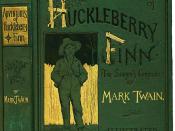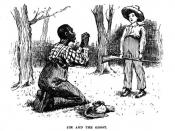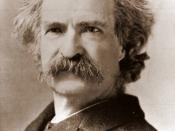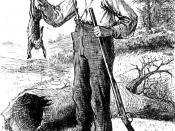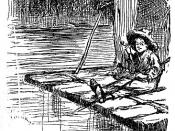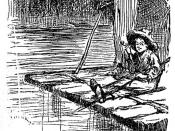The Quest In Mark Twain's novel, "The Adventures of Huckleberry Finn", the young protagonist, Huckleberry Finn is on a quest for freedom and independence. He is running from his family problems and the rules of small town Southern society. When he first ran away, he believed that he had escaped from silly rules and limitations, but he soon found out that there were just as many restrictions on the run as there were at home. There were three major obstacles, challenges and adventures in Huck's path to freedom. One obstacle was Huck's father who tried to find him, not because he loved him, but because he wanted the six thousand dollars that Huck had found on an earlier adventure with Tom Sawyer. Widow Douglas, who had become his guardian, had many rules and restrictions based on religious beliefs and the code of polite Southern society that were also an obstacle to Huck's freedom.
Jim, a black man who wanted to be freed from slavery, acts as Huck's moral guide. Jim asks Huck to follow his rules and tries to keep Huck's mind on his goal. An important factor in Huck's quest for freedom is his moral and social development. In the novel, Huck evolves from a child to an adult. He began to make wiser and proper decisions. He discovers that his quest for freedom leads him back to the very people who had given him all the rules and restrictions.
Huck lived with the Widow Douglas and Miss Watson with very strict rules and boundaries. At home, Huck liked to smoke, play with Tom Sawyer and he sometimes cursed. His rude behaviour came to an end because the Widow Douglas would not allow him to continue these bad habits. She felt they were unclean sins. Huck had to act obediently, and listen to the Widow Douglas' rules, or he would be punished. Huck disliked these boundaries and wanted to create his own rules. Even though he appreciated The Widow Douglas's generosity and charity, her restrictive lifestyle was a major reason Huck decided to stage his disappearance. His fear of his father was also another main reason. His father wanted custody of Huck because of the six thousand dollars he had found in a cave. His father was a very abusive man and was an alcoholic. Huck had to follow his father's orders, or else he would receive "cowhide".
You're educated, too, they say--can read and write. You think you're better'n your father, now, don't you, because he can't? I'll take it out of you. (pg. 28) Huck decided the only way to get away permanently from Douglas's nagging and his father's brutality was to run away. Unfortunately, his father wasn't fooled by his arranged "murder" and set out to find him. Huck was constantly on the alert for his father and feared him more than anyone else.
Jim, a "nigger" slave, who fled from Miss Watson was also running for his freedom. While Huck was hiding on Jackson's Island, he met Jim there. When he met Jim, he thought it would be all fun and games. Unfortunately, Jim had a bunch of his own rules, for example: "Don't steal something unless it's a necessity." Huck soon realized that freedom had many rules as well. Jim also showed Huck that blacks were humans above all and that his ideas about "niggers" were based on ignorance.
He was thinking about his wife and his children, away up yonder, and he was low and homesick; because he hadn't ever been away from home before in his life; and I do believe he cared just as much for his people as white folks does for their'n. (p. 155) Jim acted as Huck's moral guide by setting a good example for him and that a person can be free in the mind, even if they are slaves in society. Jim's belief that Huck was his friend and would help him along the journey to freedom, filled Huck with the weight of this responsibility. He realized how important freedom really was to Jim when Jim shouts "Pooty soon I'll be a-shoutin for joy, en I'll say, it's all on accounts o' Huck; I's a free man, en I couldn't ever ben free ef it hadn't ben for Huck; Huck done it.(p. 93) During his journey of freedom, Huck encounters many challenges, but one of the most difficult to overcome was his responsibility to make his own decisions and to evolve from a child to an adult. As Huck continued on his quest for freedom, he became more mature. He began to make wise and proper decisions. When Jim is about to be caught, Huck lies to protect him.
Then I thought a minute, and says to myself, hold on; s'pose you'd "ÃÂa' done right and give Jim up, would you felt better than what you do now? No, says I, I'd feel bad- I'd feel just the same way I do now. Well, then, says I, what's the use you learning to do right when it's troublesome to do right and ain't no trouble to do wrong, and the wages is just the same? I was stuck. (p. 95) Another example of Huck's maturity was when Jim was in danger of being hanged, Huck found the doctor whom Jim had helped in order to prove that Jim was a good man, and did not deserve to be killed. In fact, Jim had helped the doctor to save Tom Sawyer's life. Huck realized he could not abandon Jim, and that he must tell the truth and give up his "heroic" game to make Jim a free man. Tom and Huck told the Judge about the letters they received in which Miss Watson had set Jim free in her will. The wisest decision he made, however, was to return home. He returned home because he realized that he craved rules to break back at home. Huck liked to be a rebel and break the rules, so when he defied the Widow Douglas, he had his own type of personal freedom. He was very rebellious and noticed that he had no limits and was able to create his own boundaries. He not only missed the rules, but he also missed being cared for and wanted. Huck needed someone to motivate him in order to stay on task and to be part of polite society.
The importance of Huck's brief journey of freedom was to learn from his mistakes and to realize that all he ever needed was where he ran from. Huck learned from Jim that freedom meant having the personal freedom to feel what you want to feel, or to be who you want to be, but it did not give you the right to break rules and hurt others. Freedom surrounded Huck, but he didn't realize it. As John Milton wrote, "None can love freedom heartily, but good men; the rest love not freedom, but licence." In order to be free, Huck needed to follow the rules of his heart and conscience and not just the rules of society.
